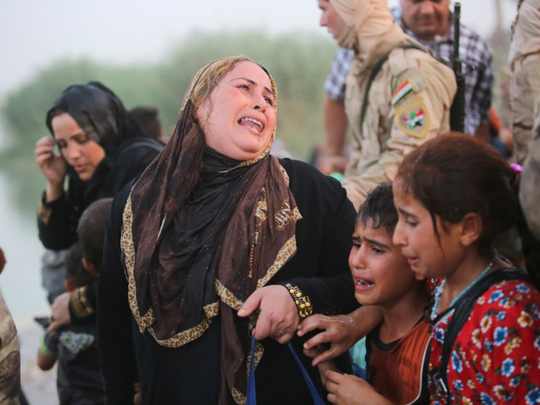
Daesh (the self-proclaimed Islamic State of Iraq and the Levant) has taken control of Ramadi, the capital of Iraq’s largest province and a city of strategic significance to the terrorist organisation. The fall of Ramadi is a blow on many fronts. It represents a damning indictment of Iraq’s security forces, its central government and the progress that Iraq is making in its efforts to reclaim the country from Daesh, since it established its self-declared caliphate last June. The fall of Ramadi has as much to do with the ineptitude of Iraq’s security forces and that of local Sunni tribes involved in the fighting as it does with Daesh’s battlefield prowess. Having been initially told to sit the conflict out, at the government’s request and the US’s bidding, Iraq’s Shiite militias — who form part of the Iranian-influenced Popular Mobilisation Unit (PMU), the umbrella group of the militias — have now been deployed to recapture the city. The survival of Iraq and the battle to defeat Daesh will, in other words, rest on the shoulders of these fighters, at least for now. Shiite militias, however, have provoked scorn from Iraq’s Sunni communities, particularly as a result of the civil conflict between Iraq’s Sunni and Shiite communities over the past decade. This resentment forms a key basis on which Daesh is able to mobilise local Sunni populations — which may be emboldened if, as expected, the Shiite militias have a long-term presence and role in the north, particularly as the case for arming and empowering local Sunni tribes is now weakened. The war on Daesh is and always has been expected to be a drawn-out conflict.
If Iraq has anything going for it, it is that the international commitment to destroy the group is increasing, as is the regional desire from neighbouring powers like Iran. Against this backdrop, the fall of Ramadi could be seen as a setback. However, reconciling Iran and the US will be crucial in the war. So will resolving divisions between Iraqis. Despite facing an existential crisis from Daesh, Iraqis remain divided. Ethno-sectarian conflict remains Iraq’s Achilles heel.
Sectarian conflict, the most potent threat to Iraq’s territorial integrity and stability since 2003, is the basis on which Daesh functions and from which it was born.
In the north, the Kurdistan region wants economic autonomy and wants to fight Daesh independently of Baghdad, which has vehemently rejected this plan, further undermining stability. The Kurds have their own local political problems, but they have been manageable and incomparable to the destructive politics going on in Baghdad. Given the fall of Ramadi, a year after the international community convened to back the Iraqi government, the case for supporting the Kurds by way of arms, technical and financial assistance continues to grow and will soon be too strong to refuse.
Iraq has no good options available. But it defies belief that Baghdad and the US are yet to capitalise on the opportunity presented by the Kurds. Despite their setback in Sinjar last year, the internationally recognised Kurdish forces remain an effective fighting force that operate off the back of strong institutions, a functioning government and stability in the Kurdistan region.
In Arab Iraq, there is a crisis of authority and the state is severely weak. While there is reluctance to deploy Shiite militias, the reality is that they remain the only effective fighting force at Baghdad’s disposal. The government and the US must accept that, while these militias will not defeat Daesh, they can, in the interim, contain it. Containing Daesh will be crucial to allow Iraq’s armed forces to reorganise, as well as allow for moderate and effective Sunni Arab actors to emerge.
The real battle will be the one to develop strong institutions and rebuild the Iraqi state. Daesh and other militant groups, like social movements in general, can exploit weak institutions and ethno-sectarian conflict. Unless these are remedied, similar organisations are likely to emerge in future generations.
— Guardian News & Media Ltd
Ranj Alaaldin is a doctoral researcher at the London School of Economics and Political Science, where he focuses on Iraq and sectarian conflict in the Middle East.










